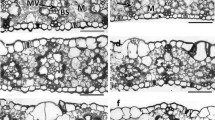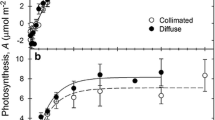Abstract
Increase in both atmospheric CO2 concentration [CO2] and associated warming are likely to alter Earths’ carbon balance and photosynthetic carbon fixation of dominant plant species in a given biome. An experiment was conducted in sunlit, controlled environment chambers to determine effects of atmospheric [CO2] and temperature on net photosynthetic rate (P N) and fluorescence (F) in response to internal CO2 concentration (C i) and photosynthetically active radiation (PAR) of the C4 species, big bluestem (Andropogon gerardii Vitman). Ten treatments were comprised of two [CO2] of 360 (ambient, AC) and 720 (elevated, EC) µmol mol−1 and five day/night temperature of 20/12, 25/17, 30/22, 35/27 and 40/32 °C. Treatments were imposed from 15 d after sowing (DAS) through 130 DAS. Both F-P N/C i and F-P N/PAR response curves were measured on top most fully expanded leaves between 55 and 75 DAS. Plants grown in EC exhibited significantly higher CO2-saturated net photosynthesis (P sat), phosphoenolpyruvate carboxylase (PEPC) efficiency, and electron transport rate (ETR). At a given [CO2], increase in temperature increased P sat, PEPC efficiency, and ETR. Plants grown at EC did not differ for dark respiration rate (R D), but had significantly higher maximum photosynthesis (P max) than plants grown in AC. Increase in temperature increased Pmax, R D, and ETR, irrespective of the [CO2]. The ability of PEPC, ribulose-1,5-bisphosphate carboxylase/oxygenase, and photosystem components, derived from response curves to tolerate higher temperatures (>35 °C), particularly under EC, indicates the ability of C4 species to sustain photosynthetic capacity in future climates.
Similar content being viewed by others
Abbreviations
- AC:
-
ambient [CO2]
- C i :
-
internal [CO2]
- [CO2]:
-
CO2 concentration
- DAS:
-
days after sowing
- EC:
-
elevated [CO2]
- ETR:
-
electron transport rate
- ETRsat and ETRmax :
-
maximal electron transport rate when ETR saturates to C i and PAR, respectively
- F:
-
fluorescence
- Fs :
-
steady state Chl fluorescence detected in “actinic light”
- Fm′ :
-
the maximal Chl fluorescence detected in “actinic light”
- LCF:
-
leaf chamber fluorometer
- P max :
-
maximum photosynthesis at PAR where P N saturates
- P N :
-
net photosynthetic rate
- P sat :
-
maximum photosynthesis at [CO2] where P N saturates
- PAR:
-
photosynthetically active radiation
- PEPC:
-
phosphoenolpyruvate carboxylase
- R D :
-
dark respiration rate
- RuBPCO:
-
ribulose-1,5-bisphosphate carboxylase/oxygenase
- T L :
-
leaf temperature
- ΦCO2 :
-
quantum yield of CO2 assimilation
- ΦPS2 :
-
maximum quantum efficiency of photosystem 2 photochemistry
References
Caemmerer, S. von: Biochemical Models of Leaf Photosynthesis.-CSIRO Publishing, Victoria 2000.
Caemmerer, S. von, Furbank, R.T.: Modeling C4 photosynthesis.-In: Sage, R.F., Monson, R.K. (ed.): C4 Plant Biology. Pp. 173–211. Academic Press, San Diego 1999.
Chen, D.-X., Coughenour, M.B., Knapp, A.K., Owensby, C.E.: Mathematical simulation of C4 grass photosynthesis in ambient and elevated CO2.-Ecol. Model. 73: 63–80, 1994.
Crafts-Brandner, S.J., Salvucci, M.E.: Sensitivity of photosynthesis in a C4 plant, maize, to heat stress.-Plant Physiol. 129: 1773–1780, 2002.
Cure, J.D., Acock, B.: Crop responses to carbon dioxide doubling: A literature survey.-Agr. Forest Meteorol. 38: 127–145, 1986.
Defries, R.S., Townsend, J.R.G.: NDVI-derived land cover classifications at a global scale.-Int. J. Remote Sens. 15: 3567–3586, 1994.
de Jiménez, E.S., Medrano, L., Martinez-Barajas, E.: Rubisco activase, a possible new member of the molecular chaperone family.-Biochemistry 34: 2826–2831, 1995.
Drake, B.G., Gonzàlez-Meler, M.A., Long, S.P.: More efficient plants: A consequence of rising atmospheric CO2?-Annu. Rev. Plant Physiol. Plant mol. Biol. 48: 609–639, 1997.
Dwyer, S.A., Ghannoum, O., Nicotra, A., Caemmerer, S. von: High temperature acclimation of C4 photosynthesis is linked to changes in photosynthetic biochemistry.-Plant Cell Environ. 30: 53–66, 2007.
Edwards, G., Walker, D.: C3–C4: Mechanisms and Cellular and Environmental Regulation of Photosynthesis.-Blackwell Scientific, Oxford 1983.
Ehleringer, J.R., Björkman, O.: Quantum yields for CO2 uptake in C3 and C4 plants. Dependence on temperature, CO2, and O2 concentration.-Plant Physiol. 59: 86–90, 1977.
Folland, C.K., Karl, T.R., Christy, J.R., Clarke, R.A., Gruza, G.V., Jouzel, J., Mann, M.E., Oeremans, J., Salinger, M.J., Wang, S.W.: Observed climate variability and change.-In: Houghton, J.T., Ding, Y. (ed.): Climate Change 2001: The Scientific Basis. Pp. 99–181. Cambridge University Press, Cambridge 2001.
Gavito, M.E., Curtis, P.S., Mikkelsen, T.N., Jakobsen, I.: Interactive effects of soil temperature, atmospheric carbon dioxide and soil N on root development, biomass and nutrient uptake of winter wheat during vegetative growth.-J. exp. Bot. 52: 1913–1923, 2001.
Hatch, M.D.: C4 photosynthesis: Evolution, key features, function, advantages.-Photosynth. Res. 34: 81, 1992.
Henderson, S.A., Caemmerer, S. von, Farquhar, G.D.: Short-term measurements of carbon isotope discrimination in several C4 species.-Aust. J. Plant Physiol. 19: 263–285, 1992.
Intergovernmental Panel on Climate Change (IPCC): Climate Change 2001: the Scientific Basis — Contributions of Working Group I to the IPCC Third Assessment Report.-Cambridge Univ. Press, New York 2001.
June, T., Evans, J.R., Farquhar, G.D.: A simple new equation for the reversible temperature dependence of photosynthetic electron transport: a study on soybean leaf.-Funct. Plant Biol. 31: 275–283, 2004.
Kakani, V.G., Reddy, K.R.: Temperature response of C4 species big bluestem (Andropogon gerardii) is modified by growing carbon dioxide concentration.-Environ. exp. Bot. 61: 281–290, 2007.
Kiirats, O., Lea, P.J., Franceschi, V.R., Edwards, G.E.: Bundle sheath diffusive resistance to CO2 and effectiveness of C4 photosynthesis and refixation of photorespired CO2 in a C4 cycle mutant and wild-type Amaranthus edulis.-Plant Physiol. 130: 964–976, 2002.
Knapp, A.K., Hamerlynck, E.P., Owensby, C.E.: Photosynthetic and water relations responses to elevated CO2 in the C4 grass Andropogon gerardii.-Int. J. Plant Sci. 154: 459–466, 1993.
Krall, J.P., Edwards, G.E.: Quantum yields of photosystem II electron transport and carbon dioxide fixation in C4 plants.-Aust. J. Plant Physiol. 17: 579–588, 1990.
Krall, J.P., Edwards, G.E.: Relationship between photosystem II and activity and CO2 fixation in leaves.-Physiol. Plant. 86: 180–187, 1992.
Lambers, H., Chapin, F.S., Pons, T.L.: Plant Physiological Ecology.-Springer, New York 1998.
Law, R.D., Crafts-Brandner, S.J., Salvucci, M.E.: High temperature stress induces the synthesis of a new form of ribulose-1,5-bisphosphate carboxylase/oxygenase activase in cotton leaves.-Arch. Biochem. Biophys. 386: 261–267, 2001.
Leakey, A.D.B., Uribellarrea, M., Ainsworth, E.A., Naidu, S.L., Rogers, A., Ort, D.R., Long, S.P.: Photosynthesis, productivity, and yield of maize are not affected by open-air elevation of CO2 concentration in the absence of drought.-Plant Physiol. 140: 779–790, 2006.
Long, S.P., Bernacchi, C.J.: Gas exchange measurements, what can they tell us about the underlying limitation to photosynthesis? Procedures and sources of error.-J. exp. Bot. 54: 2393–2401, 2003.
Loreto, F., Di Marco, G., Tricoli, D., Sharkey, T.D.: Measurements of mesophyll conductance, photosynthetic electron transport and alternative electron sinks of field grown wheat leaves.-Photosynth. Res. 41: 397–403, 1994.
Loreto, F., Tricoli, D., Di Marco, G.: On the relationship between electron transport rate and photosynthesis in leaves of the C4 plant Sorghum bicolor exposed to water stress, temperature changes and carbon metabolism inhibition.-Aust. J. Plant Physiol. 22: 885–892, 1995.
Nagy, M., Ogawa, K., Hagihara, A.: Interactive effect of CO2 enrichment and temperature on the photosynthesis of field-grown hinoki cypress (Chamaecyparis obtusa) branches.-Trees Struct. Funct. 14: 282–288, 2000.
Ottman, M.J., Kimball, B.A., Pinter, P.J., Wall, G.W., Vanderlip, R.L., Leavitt, S.W., LaMorte, R.L., Matthias, A.D., Brooks, T.J.: Elevated CO2 increases sorghum biomass under drought conditions.-New Phytol. 150: 261–273, 2001.
Patterson, D.T., Flint, E.P.: Implications of increasing carbon dioxide and climate change for plant communities and competition in natural and managed ecosystems.-In: Kimball, B.A., Rosenburg, N.J., Allen, L.H., Jr. (ed.): Impact of Carbon Dioxide, Trace Gases, and Climate Change on Global Agriculture. Pp. 83–110. American Society of Agronomy, Madison 1990.
Pearcy, R.W., Björkman, O.: Physiological effects.-In: Lemon, E.R. (ed.): CO2 and Plants. Pp. 65–105. Westview Press, Boulder 1983.
Peters, R.L., Lovejoy, T.E.: Global Warming and Biology Diversity.-Yale University Press, New Haven 1992.
Prentice, I.C., Farquhar, G.D., Fasham, M.J.R., Goulden, M.L., Heimann, M., Jaramillo, V.J., Kheshgi, H.S., Que’re, C.L., Scholes, R.J., Wallace, D.W.R.: The carbon cycle and atmospheric carbon dioxide.-In: Houghton, J.T., Ding, Y. (ed.): Climate Change 2001: The Scientific Basis. Pp. 204–237. Cambridge University Press, Cambridge 2001.
Reddy, K.R., Hodges, H.F., Read, J.J., McKinion, J.M., Baker, J.T., Tarpley, L., Reddy, V.R.: Soil-plant-atmosphere-research (SPAR) facility: a tool for plant research and modeling.-Biotronics 30: 27–50, 2001.
Sage, R.F., Kubien, D.S.: Quo vadis C4? An ecophysiological perspective on global change and the future of C4 plants.-Photosynth. Res. 77: 209–225, 2003.
Sage, R.F., Sharkey, T.D.: The effect of temperature on the occurrence of O2 and CO2 insensitive photosynthesis in field grown plants.-Plant Physiol. 84: 658–664, 1987.
Salvucci, M.E., Crafts-Brandner, S.J.: Inhibition of photosynthesis by heat stress: the activation state of Rubisco as a limiting factor in photosynthesis.-Physiol. Plant. 120: 179–186, 2004.
SAS Institute: SAS/STAT User’s Guide, Version 9.2.-SAS Institute, Cary 1999.
Stainforth, D.A., Aina, T., Christensen, C., Collins, M., Faull, N., Frame, D.J., Kettleborough, J.A., Knight, S., Martin, A., Murphy, J.M., Piani, C., Sexton, D., Smith, L.A., Spicer, R.A., Thorpe, A.J., Allen, M.R.: Uncertainty in predictions of the climate response to rising levels of greenhouse gases.-Nature 433: 403–406, 2005.
Wand, S.J.E., Midgley, G.F., Jones, M.H., Curtis, P.S.: Responses of wild C4 and C3 grass (Poaceae) species to elevated atmospheric CO2 concentration: a meta-analytic test of current theories and perceptions.-Global Change Biol. 5: 723–741, 1999.
Watling, J.R., Press, M.C., Quick, W.P.: Elevated CO2 induces biochemical and ultrastructural changes in leaves of the C4 cereal sorghum.-Plant Physiol. 123: 1143–1152, 2000.
Yamasaki, T., Yamakawa, T., Yamane, Y., Koike, H., Satoh, K., Katoh, S.: Temperature acclimation of photosynthesis and related changes in photosystem II electron transport in winter wheat.-Plant Physiol. 128: 1087–1097, 2002.
Young, K.J., Long, S.P.: Crop ecosystem responses to climate change: maize and sorghum.-In: Reddy, K.R., Hodges, H.F. (ed.): Climate Change and Global Crop Productivity. Pp. 107–127. CABI Publishing, Wallingford-New York 2000.
Ziska, L.H., Sicher, R.C., Bunce, J.A.: The impact of elevated carbon dioxide on the growth and gas exchange of three C4 species differing in CO2 leak rates.-Physiol. Plant. 105: 74–80, 1999.
Author information
Authors and Affiliations
Corresponding author
Rights and permissions
About this article
Cite this article
Kakani, V.G., Surabhi, G.K. & Reddy, K.R. Photosynthesis and fluorescence responses of C4 plant Andropogon gerardii acclimated to temperature and carbon dioxide. Photosynthetica 46, 420–430 (2008). https://doi.org/10.1007/s11099-008-0074-0
Received:
Accepted:
Published:
Issue Date:
DOI: https://doi.org/10.1007/s11099-008-0074-0




